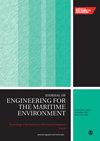Probabilistic operability and greenhouse gas assessment during dynamic positioning operations
IF 1.5
4区 工程技术
Q3 ENGINEERING, MARINE
Proceedings of the Institution of Mechanical Engineers, Part M: Journal of Engineering for the Maritime Environment
Pub Date : 2023-10-31
DOI:10.1177/14750902231203441
引用次数: 0
Abstract
A Dynamic Positioning system automatically maintains both the position and heading of a vessel by using its thrusters in the presence of external disturbances. This goal is ensured by a controller that compensates for the environmental disturbances and computes the proper set-points for each actuator. The core of such a system is composed of force and thrust allocation modules that tailor the required forces and moment over the available actuators. The propulsion systems used are often over-actuated and the thrust allocation algorithm implies an infinite number of solutions since it is impossible to solve analytically the problem. Over the years efforts from the research community dealt with the optimization in terms of accuracy, energy consumption, and maintenance with innovative allocation strategies were investigated. However, no publications or rules indicate the procedure for the evaluation of exhaust gas emission during dynamic positioning operations. For such a reason, the paper aims to develop an optimization procedure that includes an ad-hoc objective function with relative non-linear constraints for the thrust allocation logic that tends to minimize the actuators’ thrust. The procedure accounts for non-linear hydrodynamic effects on the thrust generation, including thruster-thruster and thruster-hull interactions, to obtain the most realistic results as possible. Moreover, following the IMO suggestions, the production of greenhouses gases emissions is evaluated in probabilistic terms. The proposed approach provides indicators in terms of yearly operability, fuel consumption, and environmental footprint during dynamic positioning operations that could be used for proper decisions in ship deployment.动态定位过程中的概率可操作性和温室气体评估
动态定位系统通过在存在外部干扰的情况下使用其推进器自动保持船舶的位置和航向。这一目标是由一个控制器来保证的,该控制器补偿环境干扰并计算每个执行器的适当设定点。这种系统的核心是由力和推力分配模块组成的,这些模块可以在可用的执行器上定制所需的力和力矩。所使用的推进系统往往是过度驱动的,推力分配算法意味着无穷多的解决方案,因为不可能解析解决这个问题。多年来,研究界致力于通过创新的分配策略在精度、能耗和维护方面进行优化。然而,尚无出版物或规则规定动态定位作业过程中废气排放的评估程序。因此,本文旨在开发一种优化程序,该程序包括一个具有相对非线性约束的特设目标函数,用于推力分配逻辑,趋于最小化执行器的推力。该程序考虑了非线性水动力对推力产生的影响,包括推力器-推力器和推力器-船体的相互作用,以获得尽可能真实的结果。此外,根据国际海事组织的建议,温室气体排放的产生以概率方式进行评估。该方法提供了动态定位操作期间的年度可操作性、燃料消耗和环境足迹指标,可用于船舶部署的正确决策。
本文章由计算机程序翻译,如有差异,请以英文原文为准。
求助全文
约1分钟内获得全文
求助全文
来源期刊

CiteScore
3.90
自引率
11.10%
发文量
77
审稿时长
>12 weeks
期刊介绍:
The Journal of Engineering for the Maritime Environment is concerned with the design, production and operation of engineering artefacts for the maritime environment. The journal straddles the traditional boundaries of naval architecture, marine engineering, offshore/ocean engineering, coastal engineering and port engineering.
 求助内容:
求助内容: 应助结果提醒方式:
应助结果提醒方式:


